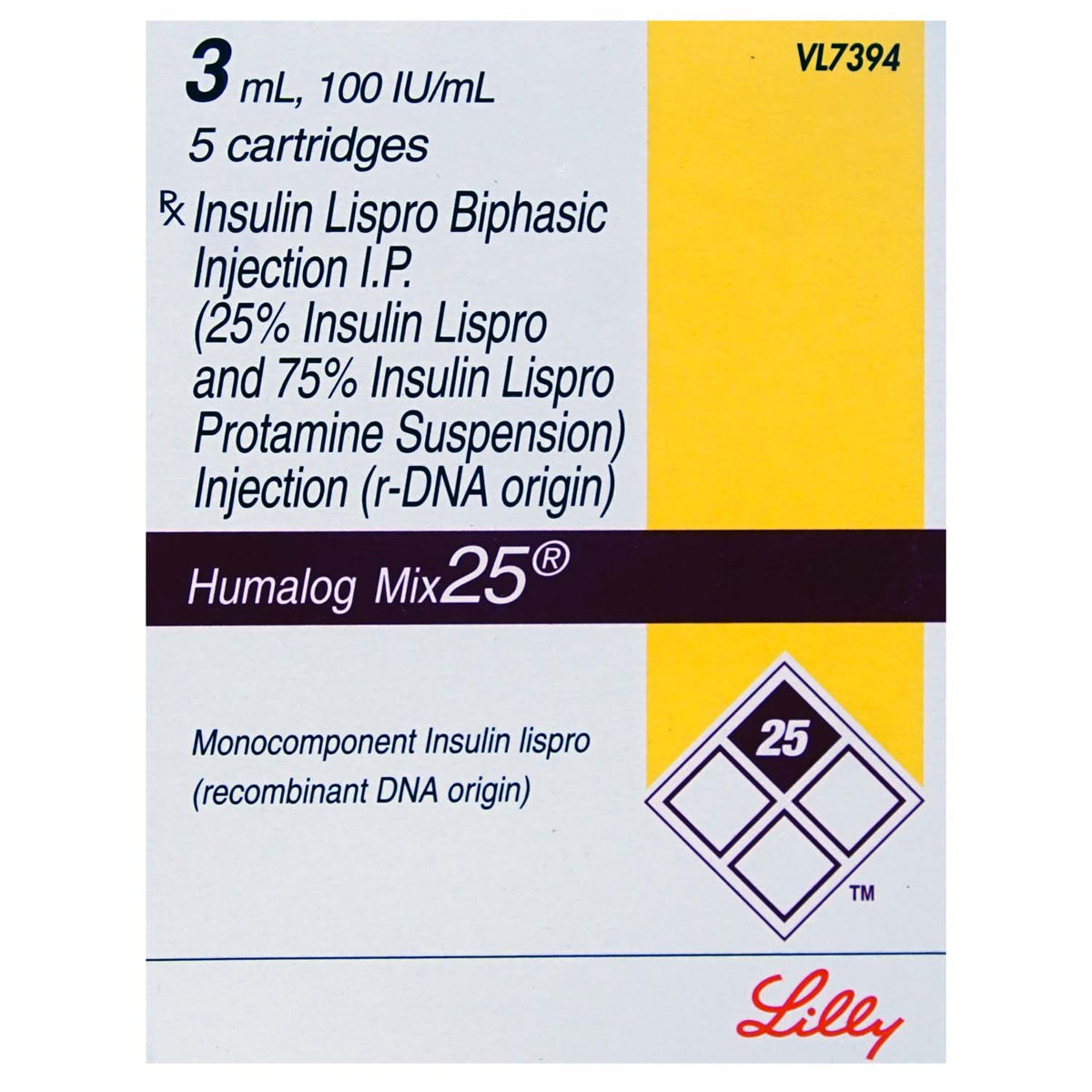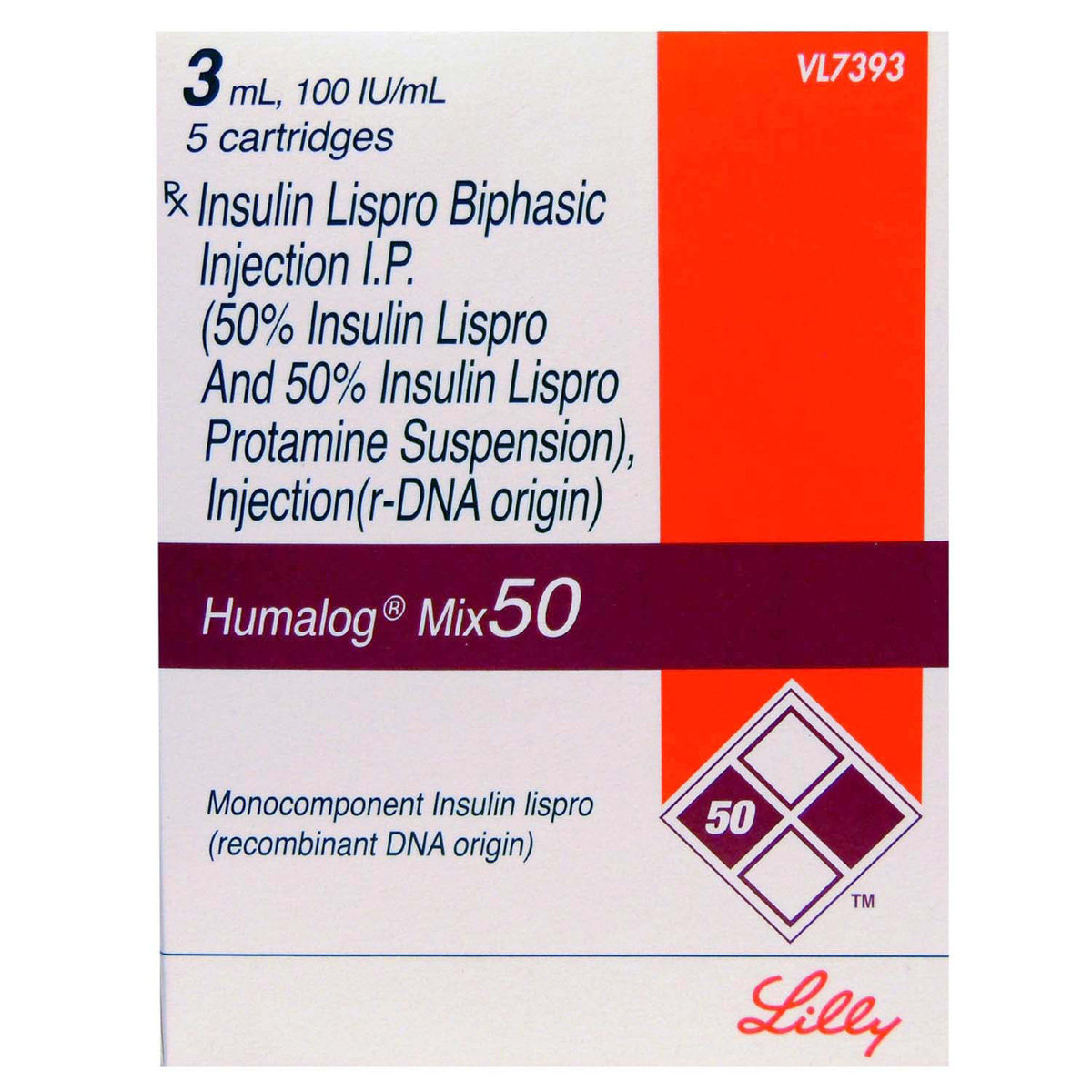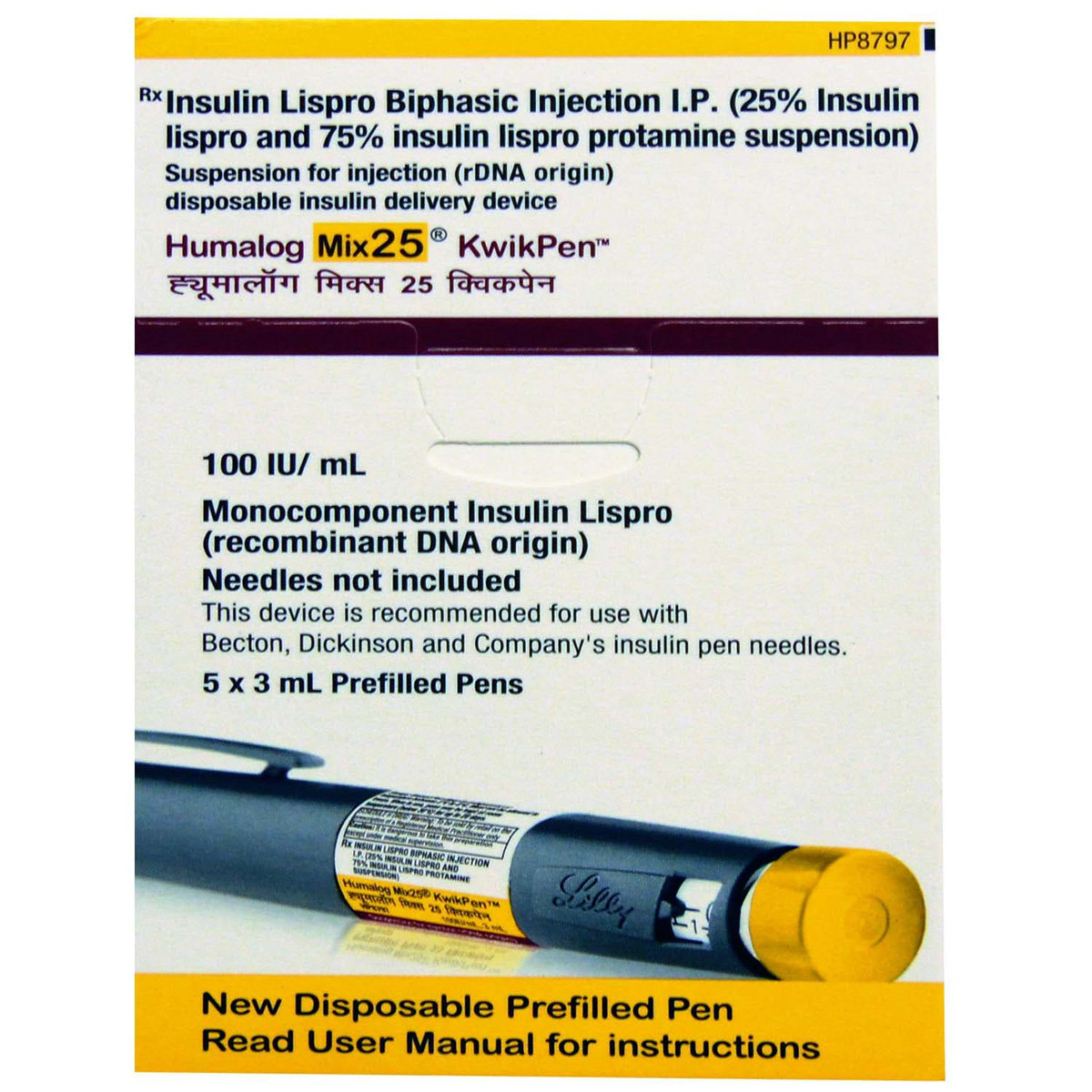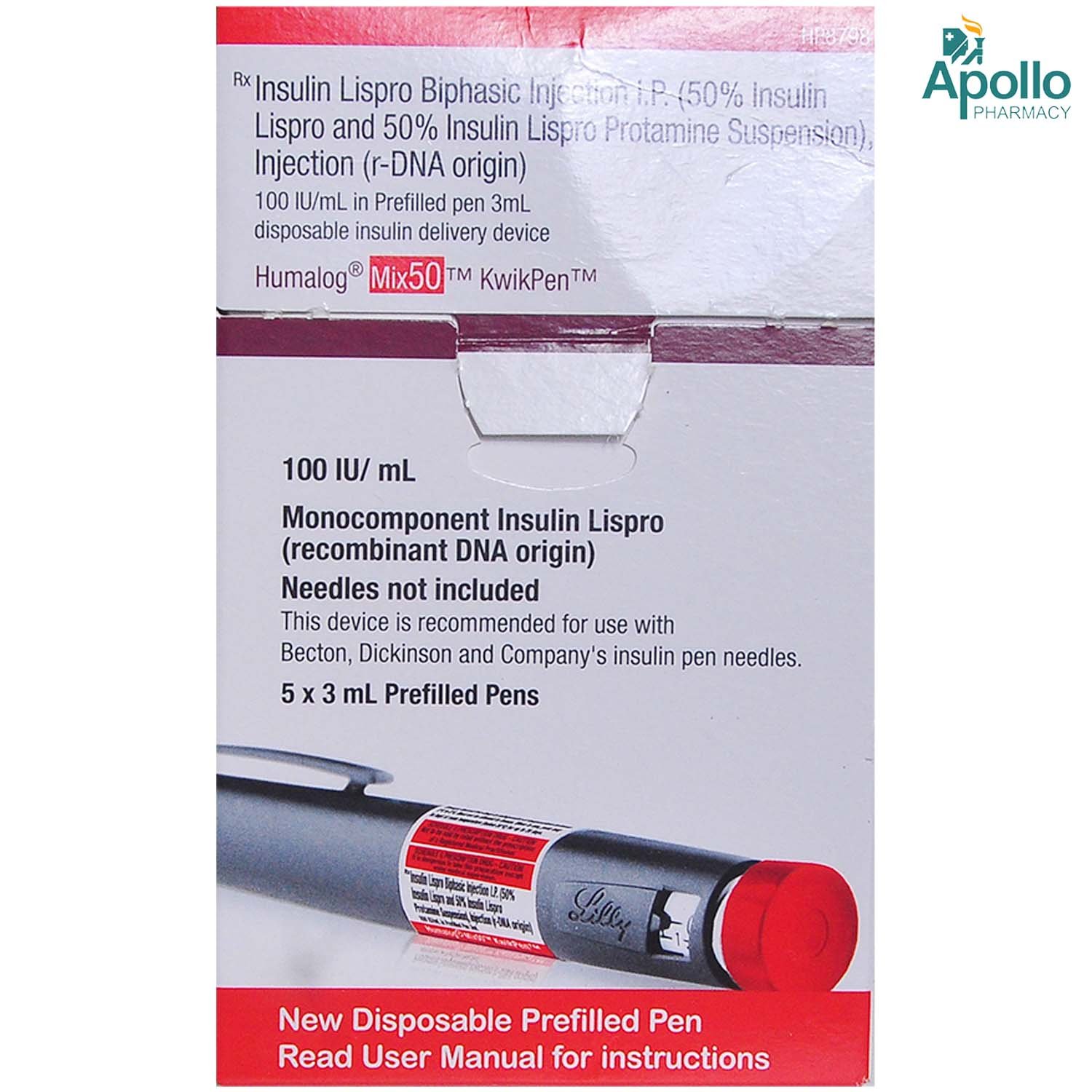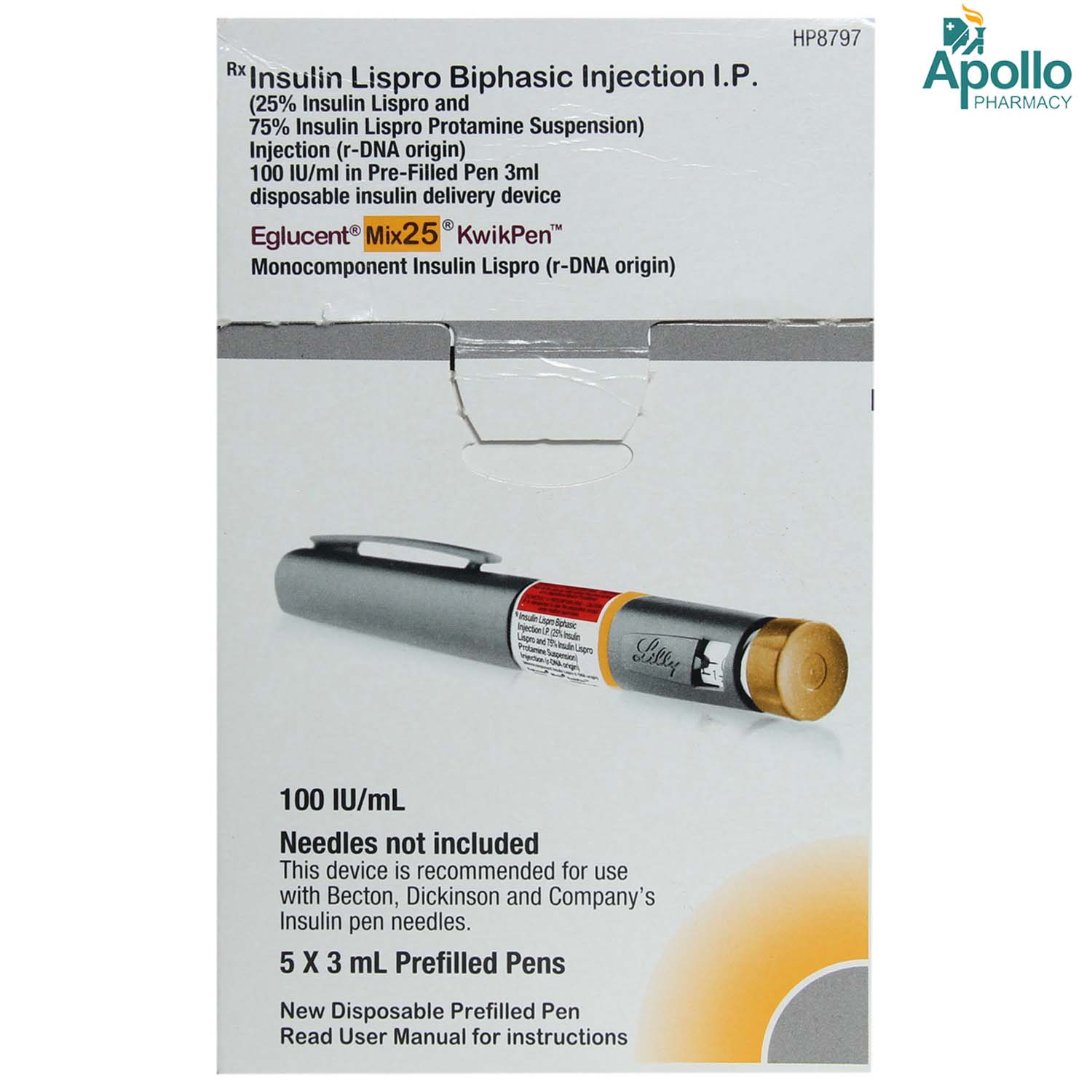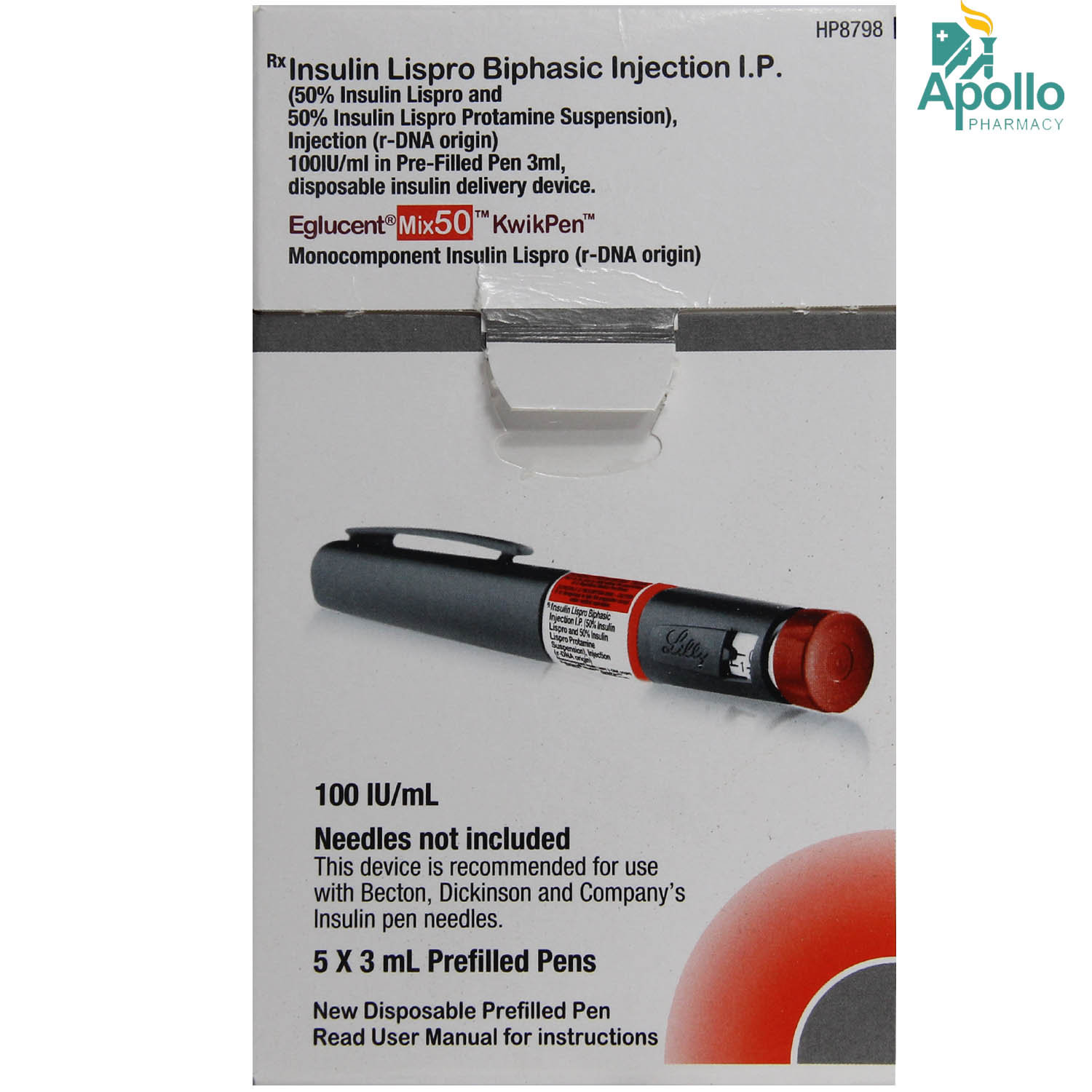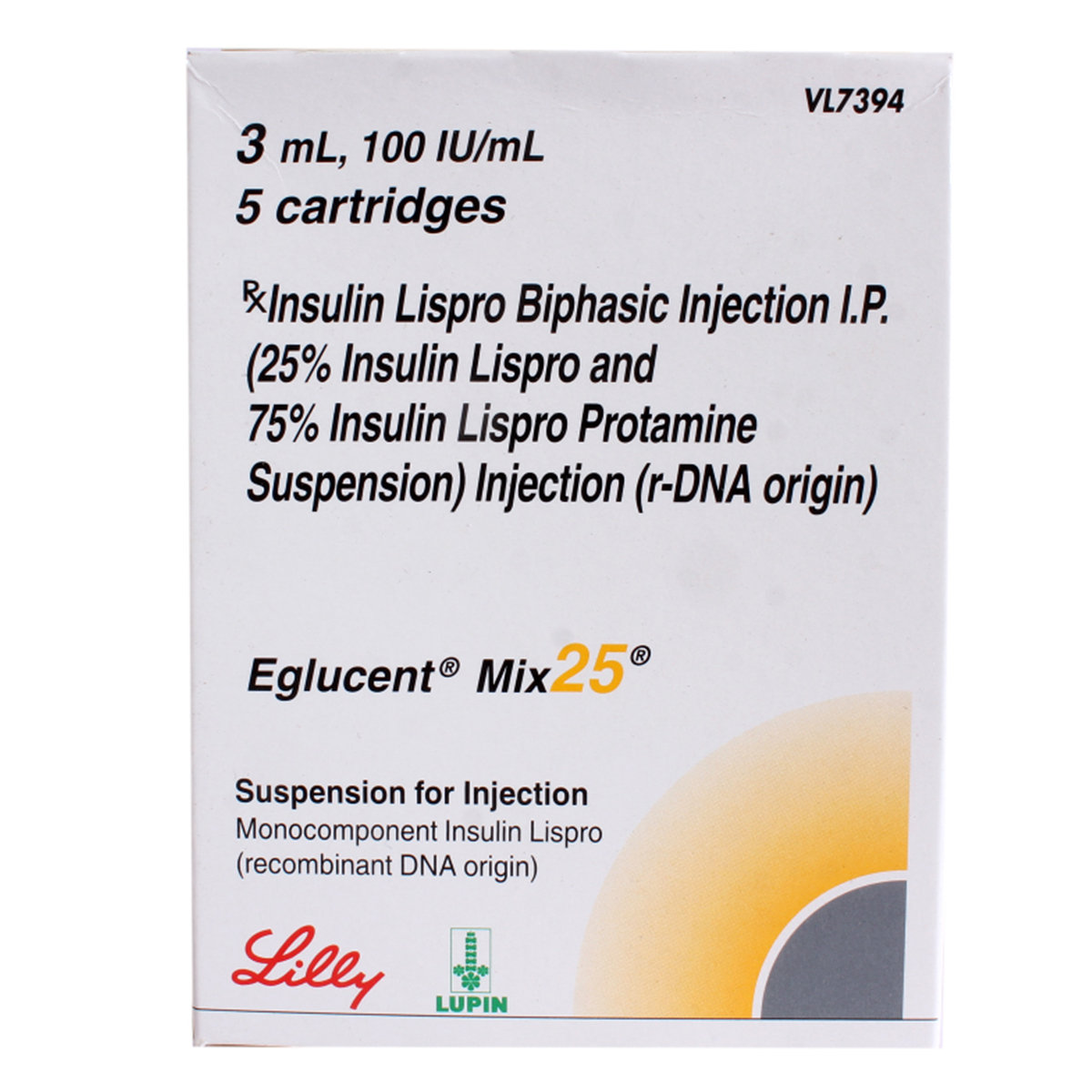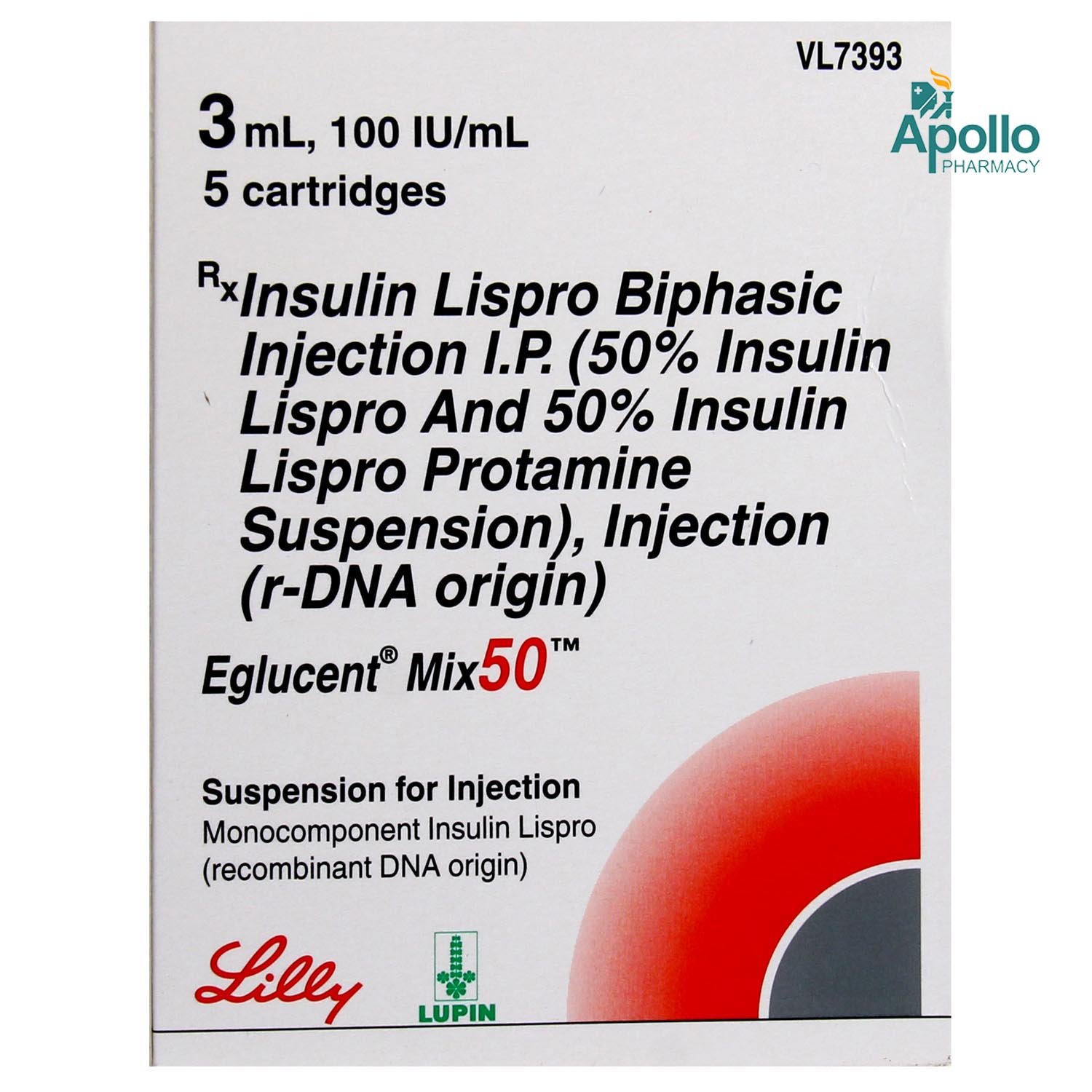Insulin Lispro+insulin Lispro Protamine
About Insulin Lispro+insulin Lispro Protamine
Insulin Lispro Protamine+insulin Lispro belongs to the class of medications called 'antidiabetics' primarily used to treat type 1 and type 2 diabetes mellitus. In diabetes mellitus type 1, the body does not produce enough insulin to regulate blood sugar levels (glucose). On the other hand, in diabetes mellitus type 2, either the body stops producing enough insulin (the hormone which helps decrease sugar levels in the blood) or there is resistance to the action of insulin. As a result, insulin is produced in large amounts leading to high blood glucose levels.
Insulin Lispro Protamine+insulin Lispro contains Insulin lispro and insulin lispro protamine. Insulin lispro is fast-acting insulin, whereas Insulin lispro protamine is an intermediate-acting insulin. Insulin Lispro Protamine+insulin Lispro suppresses the production of sugar in the liver and facilitates the reuptake of sugar in the fat and muscle cells, thereby Insulin Lispro Protamine+insulin Lispro ensures rapid and consistent sugar control.
Your doctor will advise you on how to use the Insulin Lispro Protamine+insulin Lispro. In some cases, you may experience hypoglycemia (low blood sugar), itching, mild rash, and injection site reactions like redness or swelling. Most of these side effects of Insulin Lispro Protamine+insulin Lispro do not require medical attention and gradually resolve over time. However, if the side effects are persistent, reach out to your doctor.
Insulin Lispro Protamine+insulin Lispro is recommended for use by anyone under the age of 18. Consult your doctor before taking Insulin Lispro Protamine+insulin Lispro if you are pregnant or breastfeeding. Insulin Lispro Protamine+insulin Lispro may cause hypoglycemia, so drive only if you are alert. Avoid alcohol consumption along with Insulin Lispro Protamine+insulin Lispro. Keep your doctor informed about your health condition and medications to rule out any interactions. Insulin Lispro Protamine+insulin Lispro is a cold chain medicine, it has to be stored in the refrigerator between 2-8°C else its efficiency may be lost. Do not store in the freezer.
Uses of Insulin Lispro+insulin Lispro Protamine
Medicinal Benefits
Insulin Lispro Protamine+insulin Lispro belongs to the class of medications called ‘antidiabetics’ primarily used to improve blood sugar control in adults with diabetes mellitus. Insulin Lispro Protamine+insulin Lispro is a combination of Insulin lispro and insulin lispro protamine. Insulin is a hormone that works by lowering glucose levels (sugar) in the blood. Insulin lispro is fast-acting insulin. Insulin lispro protamine is an intermediate-acting insulin. Insulin Lispro Protamine+insulin Lispro suppresses the production of sugar in the liver and facilitates the reuptake of sugar in the fat and muscle cells, thereby Insulin Lispro Protamine+insulin Lispro ensures rapid and consistent sugar control. Insulin Lispro Protamine+insulin Lispro helps prevent the chances of developing serious complications of diabetes like damage of retina (retinopathy), damage of kidney (nephropathy), damage of nerve cells (neuropathy), diabetic foot ulcer, and various complications occurring due to diabetes. Insulin Lispro Protamine+insulin Lispro starts to work within 10 minutes after injection, peaks in 2 hours and keeps working for up to 24 hours. Thereby it controls and maintains the glucose levels in the body throughout the day.
Directions for Use
Storage
Side Effects of Insulin Lispro+insulin Lispro Protamine
- Hypoglycaemia (low blood sugar level)
- Injection site reactions
- Itching
- Rash
Drug Warnings
If you are allergic to any of the contents of Insulin Lispro Protamine+insulin Lispro, please inform your doctor. Insulin Lispro Protamine+insulin Lispro is not approved for use by anyone under 18. Before taking Insulin Lispro Protamine+insulin Lispro, tell your doctor if you have ever had liver/kidney disease or low potassium levels in your blood (hypokalemia). Consult your doctor before taking Insulin Lispro Protamine+insulin Lispro if you are pregnant or breastfeeding. Drive only if you are alert as Insulin Lispro Protamine+insulin Lispro may cause hypoglycemia. Avoid alcohol consumption along with Insulin Lispro Protamine+insulin Lispro. Insulin Lispro Protamine+insulin Lispro is a cold chain medicine, and it should be stored in a refrigerator between 2-8°C; otherwise, it may lose its effectiveness. Do not freeze. Keep your doctor informed about your health condition and medicines to rule out any side effects.
Drug Interactions
Drug-Drug Interactions: Insulin Lispro Protamine+insulin Lispro may have an interaction with antidiabetics (e.g. pioglitazone), thyroid hormones (e.g. levothyroxine), blood pressure-lowering medicines (e.g. metoprolol, hydrochlorothiazide, irbesartan, candesartan), bronchodilator (e.g. metaproterenol), pain killer medications (e.g. aspirin), and anti-depressant medications (e.g. sertraline).
Drug-Food Interactions: Avoid alcoholic beverages with Insulin Lispro Protamine+insulin Lispro as it may increase or decrease your blood sugar level.
Drug-Disease Interactions: Inform your doctor before taking Insulin Lispro Protamine+insulin Lispro if you have or ever had kidney disease, hepatic impairment or liver disease, hypoglycemia (low blood sugar), and hypokalaemia (low potassium level).
Drug-Drug Interactions Checker List:
Safety Advice

Alcohol
unsafeYou are recommended not to consume alcohol along with Insulin Lispro Protamine+insulin Lispro to avoid unpleasant side effects.

Pregnancy
safe if prescribedIt is safe to use Insulin Lispro Protamine+insulin Lispro during pregnancy if prescribed by the doctor. However, consult your doctor if you have any concerns regarding this.

Breast Feeding
safe if prescribedIt is safe to use Insulin Lispro Protamine+insulin Lispro by breastfeeding mothers if prescribed by the doctor. However, consult your doctor if you have any concerns regarding this.

Driving
cautionInsulin Lispro Protamine+insulin Lispro may cause hypoglycemia (low blood sugar). Therefore, drive only if you are alert.

Liver
cautionInsulin Lispro Protamine+insulin Lispro should be taken with caution, especially if you have a history of liver diseases/conditions. The dose may have to be adjusted by your doctor.

Kidney
cautionInsulin Lispro Protamine+insulin Lispro should be taken with caution, especially if you have a history of kidney diseases/conditions. The dose may have to be adjusted by your doctor.

Children
cautionInsulin Lispro Protamine+insulin Lispro is not approved for use by anyone under the age of 18.
Habit Forming
Diet & Lifestyle Advise
- Take short, frequent meals. Avoid prolonged fasting.
- Beware of hypoglycaemia symptoms such as sweating, dizziness, palpitations, shivering, intense thirst, dry mouth, dry skin, frequent urination, etc. Whenever you experience the mentioned symptoms, immediately consume 5-6 candies or three glucose biscuits or three teaspoons of honey/sugar and get in touch with your physician. Make sure to carry these with you at all times, especially for long travels.
- Avoid drinking alcohol. It increases the risk of hypoglycaemia (decrease in blood sugar which might be fatal in some cases) and lactic acidosis (when the lactic acid increases in the body, which impacts various organs).
- Try to quit smoking.
- Reduce intake of carbohydrate-rich food like potato, rice, mangoes, bread, sugar, etc.
- Avoid eating sugary food and prefer food low in calories.
- When travelling across more than two time zones, you should talk to your doctor concerning adjustments in your insulin schedule.
Special Advise
- Your doctor may tell you to have regular potassium level tests as Insulin Lispro Protamine+insulin Lispro may cause hypokalaemia (low potassium).
- You should normally inject Insulin Lispro Protamine+insulin Lispro within 15 minutes of a meal.
- Always use a new sterile needle for each injection.
Patients Concern
Disease/Condition Glossary
Type 1 diabetes mellitus: In type 1 diabetes mellitus, the body does not make insulin (the hormone that helps decrease sugar levels in the blood) to control blood sugar levels.
Type 2 diabetes mellitus: In type 2 diabetes mellitus, either the body stops producing enough insulin, or there is resistance to the action of insulin. As a result, insulin is produced in sufficient amounts but cannot act on the tissues of the organs.
FAQs
Insulin Lispro Protamine+insulin Lispro suppresses the production of sugar in the liver and facilitates the reuptake of sugar in the fat and muscle cells, thereby Insulin Lispro Protamine+insulin Lispro ensures rapid and consistent sugar control.
You should inform your doctor before travelling especially when travelling to a different time zone as a dose adjustment may be required.
Hypoglycemia refers to low blood sugar levels. Insulin Lispro Protamine+insulin Lispro may cause hypoglycemia. The symptoms of hypoglycemia include nausea, headache, irritability, hunger, sweating, dizziness, fast heart rate, and feeling anxious or shaky. Hypoglycemia can occur if you miss or delay your food, drink alcohol, over-exercise, or take other antidiabetic medicine along with Insulin Lispro Protamine+insulin Lispro. Therefore, it is important to monitor blood sugar levels regularly. People with diabetes are advised to keep a quick source of sugar like glucose tablets, chocolate, glucose biscuits, honey, or fruit juice with them. If you experience any of the symptoms of hypoglycemia, consult your doctor.
In some cases, Insulin Lispro Protamine+insulin Lispro can lower the potassium level, leading to a state of hypokalaemia. You may feel dizziness, thirst, and general weakness in this case. So, it is advisable to have regular blood sugar and potassium level check-up.
Do not stop taking Insulin Lispro Protamine+insulin Lispro without consulting your doctor on your own as it may cause an increase in blood glucose levels. Continue taking Insulin Lispro Protamine+insulin Lispro for as long as your doctor has prescribed it to you. Do not be reluctant to speak with your doctor if you experience any difficulty while taking Insulin Lispro Protamine+insulin Lispro.

